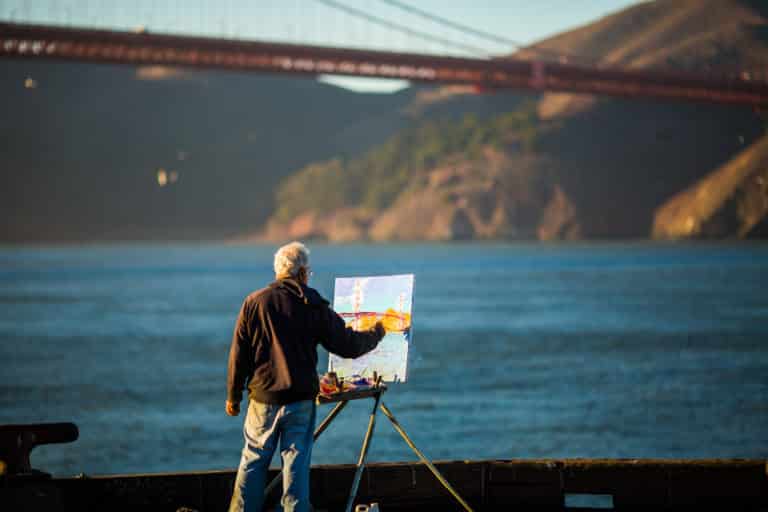
Image by Thomas Hawk/Flickr (CC BY-NC 2.0)..
Dropping Through Our Reactions
Life is so fleeting. This past week, for the very first time, I received a senior discount. On an Amtrak train.
I remembered being in England, traveling with a friend of a similar age. While visiting a park, she turned over our ID’s for a senior discount. She then chided the guard for simply accepting them and not handing them back while refuting the attempt, “Certainly you can’t be that age! You must be joking.”
He rose to the occasion and promptly played along by saying something along those lines, which she enjoyed immensely. Bizarrely, I felt like requesting similar treatment from Amtrak through my laptop. “Surely you can see I seem too young for this discount.”
After a blistering summer, I saw the first autumn leaves come out in Massachusetts. “You’re way early,” I thought, as though the pattern of nature’s changes had ever previously met with my wishes or expectations. Images of hats and scarves and gloves and Halloween came rushing in. I love autumn, and didn’t really enjoy the hot summer: still, I found a protest fomenting in my mind, “What’s your hurry? Slow down a bit.”
At the Insight Meditation Society, a retreat center I co-founded in Barre, Massachusetts, we are rolling out plans to celebrate our 40th anniversary next year. That marker seems really strange. Aren’t we talking about four years? Or perhaps 14? But not 40! How can a lifetime (in fact, my lifetime) have gone by since a small group of us first stood outside on a wintry day and looked at the building, then a Catholic novitiate, trying to decide whether to buy it? At a recent meeting, as we debated what to do to celebrate, one person suggested waiting until our 50th anniversary. As all eyes silently turned to him, that person thought better of the suggested delay.
Our sense of time is interwoven with our efforts to be in control, and our ability to let go. We get habituated to the goal of cheating time at every opportunity and bending it to our wishes. Our relationship to time warps in both directions. When circumstances feel pleasant, we want time to stop; when things feel bad, we want more than anything to push the fast-forward button.
Mainstream Western culture tends to be youth-obsessed, age-phobic, and death-denying. Delayed gratification is not often praised, and impatience is rewarded. It is not an accident that, within a month of opening the doors of the Insight Meditation Society, we received a letter addressed to the Instant Meditation Society. Isn’t that typical?
A student once asked me how he could become proficient in a certain meditation practice. I replied by saying there was a teacher in Burma particularly known for that practice and asked, “Could you go to Burma?” The student was aghast. “Burma! But that would take, like, a month!” Well, yes. It would likely take years or, depending on your framework of belief, lifetimes.
So much of the potentially corrosive impact of the passing of time — “It’s taking too long. I want in now!” or “That’s way too quick. I desperately need everything to slow down.” — depends on what we do with our minds.
Years ago, I went to see a Tibetan teacher, the late Nyoshul Khen Rinpoche, in Taiwan. I loved Khenpo (as he was known) deeply and was overjoyed at seeing him again, but I was concerned. He seemed especially frail and ill. He was never really in great health, but this time he seemed considerably worse.
After the visit, we went back to our hotel, close to where we had met him. My traveling companions and I planned to see Khenpo again in a few days, but knew that during the interim he had moved somewhere else. When the day of our second visit arrived, a group of us, holding flowers and offerings, were waiting outside our hotel for taxis to take us to the new place. I was feeling incredibly sad. It seemed that now all I could think was, “Oh, no, this could be the last time I ever see him.” The prospect was devastating, and I was deeply upset.
Every one of the taxis got completely lost in the streets of Taiwan. In that time of fruitlessly driving around, my attitude toward seeing Rinpoche suddenly shifted. I started thinking, “I’d give anything to see him one more time. One more time would be the best thing in the entire universe! It would be the greatest gift I could ever have!”
As it turned out, the taxis eventually found the right address, and we were able to see Rinpoche. Contrary to what I feared, he lived many more years, and I saw him many more times. That experience taught me a valuable lesson; I saw clearly how “one more time” can be the best prospect imaginable or the worst, depending on how I related to it.
In meditation when we speak about a different relationship to time, we are talking about a sense of an expanded present. Our protestations, our clinging to the past, our efforts to control the future may arise, but they are strongly attenuated by remembering to simply be with what is. We drop through our reactions to a space of profound connection.
Of course it is not only in meditation that we can experience this, but in so many arenas of life. We can experience this kind of connection during interludes in nature (as evoked by Wordsworth in his famous poem “Intimations of Immortality”). We can experience the expanded present while creating or viewing works of art. We can experience it in luminous moments of love.
I think of meditation as not just a platform for experience, but a cultivation. Then, when we are freaked out at summer turning into autumn or being eligible for yet another discount, we can exercise the letting-go muscle we’ve developed, remember to be with what is, and be grateful for this moment.

